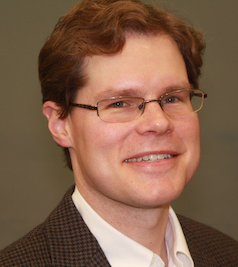 Dr. Robert Gould will open the doors to his new laboratory this summer in the department of Physiology and Pharmacology at the Wake Forest School of Medicine (WFSOM). Dr. Gould, who has dedicated his research career to studying substance use disorders, will be bringing a vibrant perspective and translational techniques. Dr. Gould shares with us his research goals, what projects he is most excited about starting, and his path to selecting WFSOM as the home of his new lab.
Dr. Robert Gould will open the doors to his new laboratory this summer in the department of Physiology and Pharmacology at the Wake Forest School of Medicine (WFSOM). Dr. Gould, who has dedicated his research career to studying substance use disorders, will be bringing a vibrant perspective and translational techniques. Dr. Gould shares with us his research goals, what projects he is most excited about starting, and his path to selecting WFSOM as the home of his new lab.
Dr. Gould’s research looks at substance use disorders from a different angle, specifically focusing on how drug-induced sleep disruption contributes to relapse. To date, sleep disruptions and their role as a barrier to recovery from substance use disorders have been greatly overlooked. “We know sleep is disrupted during abstinence following repeated use of almost every abused substance. The deck is really stacked against an individual recovering from a substance use disorder. As a society, we want an individual to achieve and maintain abstinence knowing that changes in the brain lead to difficulties affecting everyday life such as sleep and cognition making it more difficult to maintain a healthy lifestyle,” Dr. Gould explains. Substance-induced sleep disturbances are not only robust but also present in abstinence from drug use for months, if not years, making them an incredibly important factor to consider when designing therapeutics to treat substance use disorders.
Dr. Gould developed his interest in studying the important role of sleep in neuropsychiatric disorders, such as substance abuse, during his postdoctoral training in the laboratory of Dr. Carrie Jones at Vanderbilt University in the Department of Pharmacology and the Center for Neuroscience Drug Discovery (VCNDD). Here, he utilized cutting-edge techniques, including electroencephalography (EEG) and functional MRI in rodents, to measure brain activity and examine brain-behavior relationships of novel allosteric modulators for G protein-coupled receptors, such as the metabotropic glutamate 5 (mGlu5) receptor, to understand their role in, and develop treatments for various neuropsychiatric disorders including substance use disorder, schizophrenia, and aging. While reflecting upon his training at the VCNDD, Dr. Gould explains, “One of the biggest things that I've learned is the need for biomarkers of brain function in drug discovery to translate findings from animal models to human research.” Working with Dr. Jones, he helped set up an EEG research program to be used as a translational biomarker for drug discovery efforts. Dr. Gould explains how “incredibly rewarding it is to see the potential utility in using EEG or fMRI to monitor disease progression in both animal models and humans and, from a drug discovery perspective ultimately use it to tailor treatments perhaps as a personalized medicine approach for CNS disorders.” Dr. Gould will be bringing these powerful techniques into his own lab and apply them to monitoring various stages of substance use disorders.
The research interests of Dr. Gould’s new lab closely align with his dedicated and ongoing passion for studying substance use disorders. To shed light on the important relationship between sleep deficits and substance use disorders, Dr. Gould will be tapping into expertise from his early research career. Having trained in the laboratory of Dr. Michael Nader at WFSOM, he developed extensive skills in behavioral pharmacology and cocaine self-administration while studying the neurobiological alterations underlying cognitive impairments associated with abstinence following cocaine self-administration in macaque monkeys. His research in the Nader lab elucidated a number of potential pharmacological targets for the treatment for these cognitive disturbances following cocaine use. This comprehensive training in behavioral pharmacology and drug self-administration will be a focal point in Dr. Gould’s new lab, allowing him to answer important questions about how sleep disturbances alter drug self-administration and promote relapse.
Upon his return to Wake Forest to start his own laboratory, he will combine expertise from his pre- and postdoctoral training to focus on understanding sleep differences using EEG, normalizing these disturbances with selective pharmacological agents and to see how this influences drug-related behaviors. When asked what factors motivated him to return to WFSOM, Dr. Gould explained, “The Physiology and Pharmacology department at Wake Forest truly has a collaborative team science environment which has made this department so successful in the substance use disorder research field.” Having been a trainee in this department himself, he elaborates that, “Another important component was the training environment. It is amazing to see all of the alumni who are successful in a diverse range of fields and disciplines. It really reiterates how strong the training there is, and I want to contribute to training that next generation of scientists.”
If you would like to contribute to this blog, please contact Luisa Torres at luisa@intelispark.com.
All content provided on the NEU blog is for informational purposes only. The statements and opinions contained in the blog posts are solely those of the individual authors and contributors and not of the American Society for Pharmacology and Experimental Therapeutics (ASPET). ASPET makes no representations as to the accuracy or completeness of any information on this site or found by following any link on this site and will not be liable for any errors or omissions in this information nor for the availability of this information. ASPET will not be liable for any losses, injuries, or damages from the display or use of this information. ASPET also does not endorse any products or services mentioned in this blog.